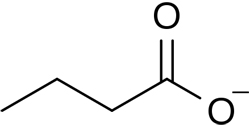What is butyrate and why it is so important?


Butyrate Molecular Structure
Butyrate or butanoate is the traditional name for the conjugate base of butyric acid (also known as butanoic acid). The formula of the butyrate ion is C 4H 7O− 2. Butyrate is a functionally versatile molecule that is produced in the mammalian gut by fermentation of dietary fibre and is enriched in butter and other dairy products.
Butyrates are important as food for cells lining the mammalian colon (colonocytes). Without butyrates for energy, colon cells undergo autophagy (self digestion) and die. Short-chain fatty acids (SCFAs), which include butyrate, are produced by beneficial colonic bacteria (probiotics) that feed on, or ferment prebiotics, which are plant products that contain adequate amounts of dietary fiber. These SCFAs benefit the colonocytes (cells of the colon) by increasing energy production and cell proliferation, and may protect against colon cancer.
Butyrate possesses both preventive and therapeutic potential to counteract inflammation-mediated ulcerative colitis (UC) and colorectal cancer. The reason why butyrate is an energy source for normal colonocytes and induces apoptosis in colon cancer cells, is due to the Warburg effect in cancer cells, which leads to butyrate not being properly metabolized. This phenomenon leads to the accumulation of butyrate in the nucleus, acting as a histone deacetylase (HDAC) inhibitor.(See: Revisit dietary fiber on colorectal cancer: butyrate and its role on prevention and treatment). One mechanism underlying butyrate function in suppression of colonic inflammation is inhibition of the IFN-γ/STAT1 signaling pathways at least partially through acting as a HDAC inhibitor. It has been shown that Butyrate inhibits activity of HDAC1 that is bound to the Fas gene promoter in T cells, resulting in hyperacetylation of the Fas promoter and upregulation of Fas receptor on the T cell surface. It is thus suggested that butyrate enhances apoptosis of T cells in the colonic tissue and thereby eliminates the source of inflammation (IFN-γ production).[See:Butyrate suppresses colonic inflammation through HDAC1-dependent Fas upregulation and Fas-mediated apoptosis of T cells]... Data suggests -".. that butyrate delivers a double-hit: induction of T cell apoptosis to eliminate the source of inflammation and suppression of IFN-γ-mediated inflammation in colonic epithelial cells, to suppress colonic inflammation..."
How does the body get butyrate?
Butyrate can be obtained in foods including grass fed butter, raw milk and certain plant oils and animal fats. Apart from being found in certain foods, it can also be formed in the gut through the fermentation of dietary fiber and carbohydrates.
Health Benefits of Butyrate
"...At the intestinal level, butyrate exerts multiple effects such as the prevention and inhibition of colonic carcinogenesis, the improvement of inflammation, oxidative status, epithelial defense barrier, and the modulation of visceral sensitivity and intestinal motility. At the extraintestinal level, potential fields of application for butyrate seem to be the treatment of sickle cell disease, β-thalassemia, cystic fibrosis, urea cycle enzyme deficiency, X-linked adrenoleukodystrophy, hypercholesterolemia, obesity, insulin resistance, and ischemic stroke. In conclusion, a growing number of studies have revealed new mechanisms and effects of butyrate with a wide range of potential clinical applications from the intestinal tract to peripheral tissues. However, more clinical studies to elucidate the role of butyrate in health and diseases and new solutions for easier administration are needed..." See: Potential beneficial effects of butyrate in intestinal and extraintestinal diseases
Fats in Cooking and Health
- What are the differrent types of fatty acids?
- What are Trans Fats?
- What is the difference between LDL and HDL?
- What are the different types of omega 3 fatty acid?
- What are omega-6 fatty acids?
- The importance of the ratio of omega-6/omega-3 essential fatty acids
- What is the difference between saturated and unsaturated fats?
- What causes oils to go rancid?
- What are essential fatty acids?
- Duck Fat as an alternative to butter
- How to render duck fat
- Did butter get a bad rap?
Types of Fatty Acids
Saturated